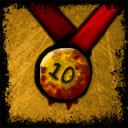Steam installieren
Anmelden
|
Sprache
简体中文 (Vereinfachtes Chinesisch)
繁體中文 (Traditionelles Chinesisch)
日本語 (Japanisch)
한국어 (Koreanisch)
ไทย (Thai)
Български (Bulgarisch)
Čeština (Tschechisch)
Dansk (Dänisch)
English (Englisch)
Español – España (Spanisch – Spanien)
Español – Latinoamérica (Lateinamerikanisches Spanisch)
Ελληνικά (Griechisch)
Français (Französisch)
Italiano (Italienisch)
Bahasa Indonesia (Indonesisch)
Magyar (Ungarisch)
Nederlands (Niederländisch)
Norsk (Norwegisch)
Polski (Polnisch)
Português – Portugal (Portugiesisch – Portugal)
Português – Brasil (Portugiesisch – Brasilien)
Română (Rumänisch)
Русский (Russisch)
Suomi (Finnisch)
Svenska (Schwedisch)
Türkçe (Türkisch)
Tiếng Việt (Vietnamesisch)
Українська (Ukrainisch)
Ein Übersetzungsproblem melden


 United States
United States 



























































א (Aleph): Represents a glottal stop, like the "a" in "father."
ב (Bet/Vet): Sounds like "b" (as in "bat") or "v" (as in "vat"), depending on context.
ג (Gimel): Similar to the "g" in "go."
ד (Dalet): Like the "d" in "dog."
ה (He): Sounds like "h" (as in "hat").
ו (Vav): Similar to "v" (as in "vat") or "w" (as in "wonder").
ז (Zayin): Like the "z" in "zebra."
ח (Het): A guttural sound, similar to the Scottish "loch" or the Spanish "j" in "jalapeño."
ט (Tet): Similar to the "t" in "top."
י (Yod): Like the "y" in "yes."
כ (Kaf): Sounds like "k" (as in "kite") or "ch" (as in "loch").
ל (Lamed): Similar to the "l" in "love."
מ (Mem): Like the "m" in "mother."
Feel free to practice these sounds and explore more about biblical Hebrew! 😊📜